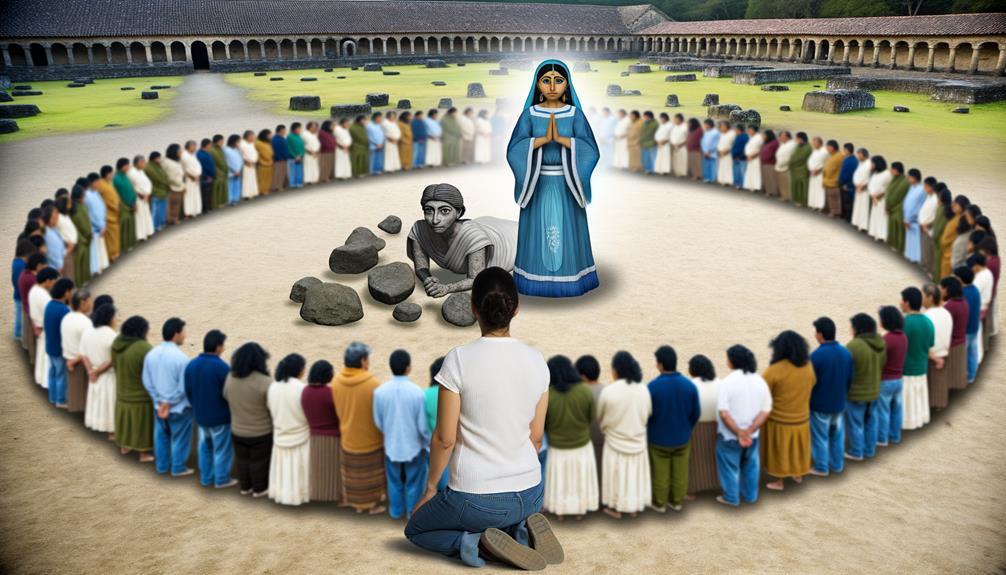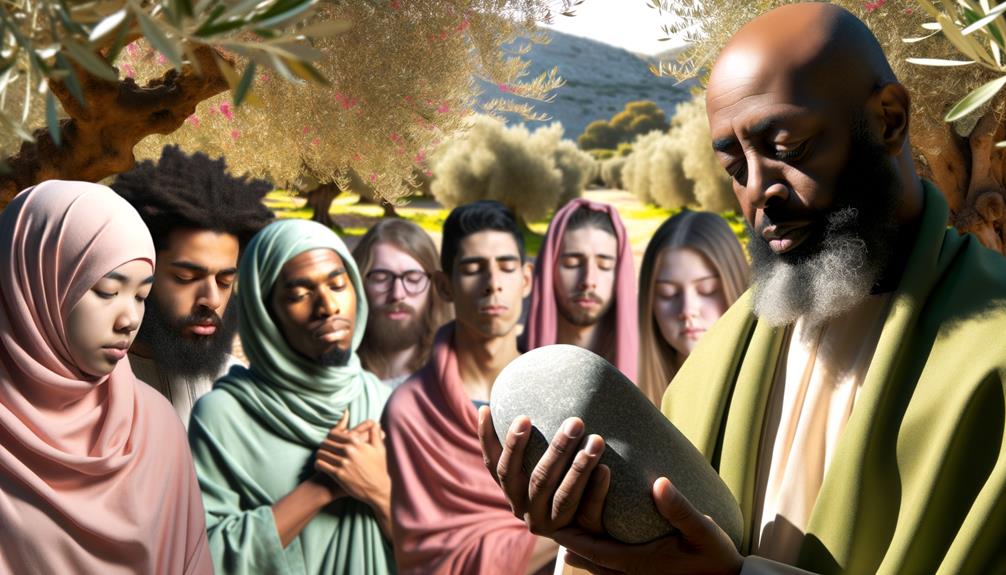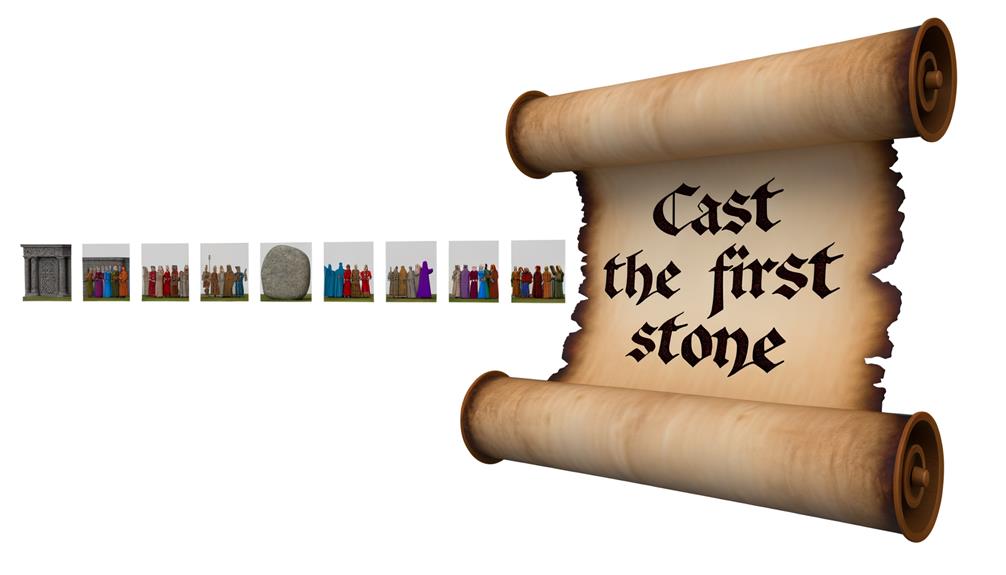Cast the First Stone Bible Verse Meaning: Judgement
The phrase ‘He that is without sin, cast the first stone‘ (John 8:7) exemplifies Jesus’ transformative approach to mercy and judgment. Set in Jerusalem, amidst tension between Jesus and Jewish leaders, it occurs during a test involving a woman accused of adultery.
Jesus shifts the accusatory focus to the sinfulness of the accusers themselves, challenging the harsh legalism of Mosaic Law with a call for self-reflection and empathy. This story underscores Jesus’ radical emphasis on forgiveness and human fallibility, prompting a deep self-examination before condemning others.
For more insights into its profound themes, explore further.

Cast the First Stone Bible Verse Meaning and Lessons
| Aspect | Details |
|---|---|
| Bible Reference | John 8:7 |
| Key Themes | Forgiveness, humility, judgment, mercy |
| Symbolism | Stones represent judgment and condemnation |
| Historical Context | Jesus challenges self-righteousness in the story of the adulterous woman |
| Spiritual Insight | Encourages self-reflection and showing mercy before condemning others |
Historical Context

Regularly cited in theological discourse, the phrase ‘cast the first stone‘ originates from a pivotal moment in the New Scriptures, specifically in the Gospel of John, chapter 8, verses 1-11.
The historical context of this passage is essential for a thorough understanding. It occurs during a period of heightened tension between Jesus and the Jewish religious leaders. Roman occupation had complicated Jewish legal and religious practices, causing leaders to navigate their authority carefully.
Within this socio-political milieu, Jesus’ response to the accusing crowd underscores a profound critique of judicial and moral hypocrisy. This context illuminates the gravity of Jesus’ words, emphasizing themes of mercy, justice, and the human propensity for judgment, central to the theological implications of the passage.
The Story in John 8

The narrative in John 8 presents a profound theological encounter where a woman caught in adultery is brought before Jesus by the Pharisees, seeking to test Him.
Jesus’ response, encapsulated in His statement, ‘Let him who is without sin cast the first stone,’ challenges the accusers and redirects the focus from legalistic condemnation to self-reflection and grace.
This passage underscores a powerful message of forgiveness and the transformative power of mercy within the framework of divine justice.
Woman Caught in Adultery
One of the most profound narratives illustrating Jesus’ teachings on mercy and judgment unfolds in John 8, where a woman caught in adultery is brought before Him by the Pharisees. This event occurs in the Temple courts, underscoring its public and humiliating nature. The Pharisees cite Mosaic Law, which prescribes stoning for adultery, aiming to trap Jesus between upholding the law and demonstrating compassion.
Historical Context: The setting is Jerusalem during the Feast of Tabernacles.
Scriptural Accuracy: The account is documented in John 8:1-11.
Pharisaic Intent: They sought to discredit Jesus’ authority.
Public Spectacle: The woman’s shame was leveraged to challenge Jesus.
Mosaic Law: Adultery was punishable by stoning as per Leviticus 20:10.
This story sets the stage for Jesus’ profound response.
Jesus’ Response to Accusers
Amidst the tension, Jesus’ response to the accusers in John 8 reveals profound theological insights into mercy and justice.
Confronted by the Pharisees and scribes who sought to entrap Him with the law, Jesus subverts their intentions by stating, ‘He that is without sin among you, let him first cast a stone at her’ (John 8:7).
This pronouncement shifts the focus from the accused woman to the accusers themselves, highlighting their own sinfulness.
Historically, this moment underscores the Mosaic Law‘s requirement for the accusers to be free of guilt (Deuteronomy 17:7).
Scripturally, it emphasizes divine wisdom, turning a trap into an opportunity for self-reflection, and illustrating the balance between divine justice and human fallibility.
Message of Forgiveness
In this powerful moment of confrontation, Jesus not only exposes the hypocrisy of the accusers but also extends a profound message of forgiveness to the accused woman, illustrating the boundless mercy inherent in divine justice.
The narrative in John 8 reveals that no one is without sin, hence disqualifying any human from passing ultimate judgment. Jesus’ invitation, ‘Let him who is without sin cast the first stone,’ underscores the need for self-reflection and compassion.
Key takeaways include:
- Hypocrisy exposed: Highlights the double standards of the accusers.
- Universal sinfulness: Emphasizes that all have sinned and fall short of divine standards.
- Divine mercy: Showcases Jesus’ role as a forgiver rather than a condemner.
- Call for repentance: Encourages the woman to ‘go and sin no more.’
Jesus’ Response

Jesus’ response to the accusers, who brought a woman caught in adultery before Him, transcends mere legalism and reveals a profound theological principle of grace and justice.
In John 8:7, He states, ‘Let any one of you who is without sin be the first to throw a stone at her.’ This statement not only disarms the accusers but also shifts the focus from the woman’s sin to the universal human condition of sinfulness.
By doing so, Jesus upholds the law’s moral authority while simultaneously introducing a paradigm of compassion and self-reflection.
His response encapsulates the essence of divine mercy, encouraging the pursuit of justice tempered with empathy and humility, thereby redefining the community’s approach to sin and judgment.
Legal and Moral Dilemmas

The encounter between Jesus and the accusers of the adulterous woman presents a complex interplay of legal and moral dilemmas, as it juxtaposes the strict adherence to Mosaic Law with the emergent principles of grace and forgiveness.
This narrative compels us to examine:
- Mosaic Law: The requirement to punish adultery by stoning, reflecting the severity of sin.
- Roman Law: The lack of authority among Jews to execute capital punishment.
- Jesus’ Wisdom: His response highlights the importance of self-examination before condemning others.
- Moral Authority: Questioning who holds the right to judge and execute punishment.
Through these lenses, we see a profound ethical dialogue unfold.
Themes of Mercy

Within the narrative of the adulterous woman, Jesus’ response exemplifies a profound embodiment of mercy, challenging the prevailing legalistic interpretations of Mosaic Law.
By stating, ‘He who is without sin among you, let him cast the first stone,’ Jesus redirects the focus from punitive justice to self-reflection and compassion.
This act underscores a significant shift from strict adherence to the letter of the law towards embracing the spirit of love and forgiveness.
Theologically, it resonates with the broader biblical themes of God’s grace and the call to emulate divine mercy.
Historically, this event critiques the harsh implementations of the law and advocates for a more humane and redemptive approach in addressing human failings.
Interpretations Over Time

Across centuries, interpretations of the phrase ‘let him cast the first stone’ have evolved, reflecting shifts in theological emphasis, cultural norms, and scriptural exegesis.
Early Christian thought often highlighted divine mercy and the imperative of forgiveness, aligning with the teachings of Jesus.
Medieval interpretations sometimes emphasized the moral authority of the church to adjudicate sin.
The Reformation brought renewed focus on individual conscience and grace.
Enlightenment thinkers viewed the phrase as a call to reason and personal morality over institutional judgment.
Contemporary scholarship often examines the socio-political context of the text, emphasizing themes of justice and compassion.
- Early Christian views on divine mercy
- Medieval authority and moral adjudication
- Reformation focus on individual conscience
- Enlightenment emphasis on reason and morality
Modern-Day Relevance

In contemporary discourse, the phrase ‘let him cast the first stone’ serves as a poignant reminder of the ethical imperative to practice humility and self-reflection before passing judgment on others.
Originating from John 8:7, where Jesus challenges the accusers of an adulterous woman, the verse transcends its historical context to address modern societal tendencies toward quick condemnation.
In today’s digital age, where social media often amplifies judgmental attitudes, the scriptural call for introspection and mercy remains profoundly relevant.
Reflecting Jesus’ message, it underscores the importance of recognizing our own imperfections, fostering a culture of empathy rather than condemnation.
This enduring wisdom encourages a more compassionate and understanding approach to interpersonal relationships and community dynamics.
Lessons for Personal Reflection

Embracing the message of John 8:7 within our personal lives invites us to engage in deep self-examination and spiritual growth, recognizing that our own imperfections call for a heart of humility and mercy.
This verse, set against the backdrop of ancient Judaic law and Jesus’ radical ministry, compels us to rethink our tendencies to judge others. It invites us to reflect on the complexities of human nature and the often harsh consequences of our snap judgments. In the context of spirituality, the concepts of hades and divine judgment explained in scripture remind us that ultimate authority rests beyond our perceptions, urging us to cultivate compassion rather than condemnation.
Reflecting on this passage, we can draw valuable lessons:
- Self-Examination: Acknowledge personal faults before criticizing others.
- Compassion: Cultivate empathy and understanding towards others’ struggles.
- Forgiveness: Embrace forgiveness as a central tenet of Christian life.
- Humility: Recognize our own need for grace and mercy from God.
Such reflections enrich our spiritual journey and align us closer to Christ’s teachings.
Conclusion
The account of Jesus challenging those without sin to cast the first stone in John 8 underscores profound theological themes of mercy, justice, and human fallibility.
Historically, this narrative has sparked extensive debate, influencing Christian thought and jurisprudence.
Significantly, a 2015 Pew Research survey revealed that 70% of Christians believe in forgiveness and mercy over strict adherence to punitive measures, reflecting the enduring impact of this biblical passage on contemporary moral perspectives and legal frameworks.






